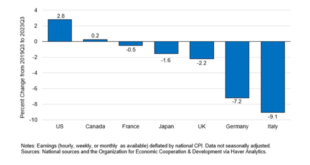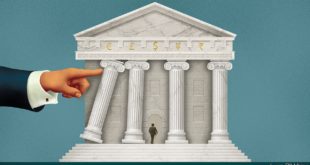För alla som är naiva nog att tro att centralbankschefers arbete bygger på gediget evidensbaserad vetenskap — glöm det! Vad den här dokumentären övertygande dokumenterar är att centralbankschefers arbete inte är mycet mer än subtilt sagoberättande bondfångeri — och att de själva vet om det. Se den!
Read More »Inflationsmålet — en helig ko som höftades till
Inflationsmålet — en helig ko som höftades till Han kan beskrivas som det svenska inflationsmålets fader.Men i en ny dokumentär kallas 30 år av penningpolitik med fokus på 2-procentig inflation för ”en kyrka” av den före detta vice riksbankschefen.– Det var inte särskilt vetenskapligt underbyggt, säger Thomas Franzén i SVT:s ”Skuldfeber”. Hösten 1990 hade inflationen klättrat till mer än 10 procent och den stora svenska finanskrisen var på väg att brisera...
Read More »Det finanspolitiska ramverkshaveriet
Förhoppningarna var stora om att den parlamentariska kommittén som vart åttonde år ser över ramverket skulle ta Sveriges investeringsbehov i beaktande och reformera ramverket för att möjliggöra underskott under de år investerings- och underhållsskulden betas av. Resultatet blev ett balansmål som inte ens täcker hälften (cirka 25 miljarder) av den prognostiserade minsta nivån för behovet av offentliga utgiftsökningar för samhällsviktiga investeringar. Arena Idé har i en egen...
Read More »Det bidde en tummetott — det nya finanspolitiska ramverket
Det bidde en tummetott — det nya finanspolitiska ramverket I Starta Pressarna fortsätter debatten om det finanspolitiska ramverket och behovet av stora framtida investeringar i infrastruktur, bostäder, försvar och energiomställning. I det här avsnittet vädrar Daniel Suhonen, Enna Gerin och Max Jerneck ett berättigat missnöje över den överenskommelse som regeringen i samförstånd med SD, C och socialdemokraterna slutit om ett nytt finanspolitiskt...
Read More »How to deal with inflation?
In Europe (the Euro area, to be precise), both unemployment and inflation are down, according to Eurostat,. Which, again, shows that the Phillips curve, a crucial concept behind neoclassical macroeconomic thinking that assumes a more or less stable negative relation between unemployment and inflation (high unemployment will bring inflation down), is not the place to go when predicting or analysing inflation. Sometimes, this relation is specified as a relation between wage increases and...
Read More »Nu är det dags att kasta finanspolitikens tvångströja
Detta överskottsmål, som kanske låter sunt och försiktigt och utgörande en del av vårt lutherska kulturarv och därmed en del av vår ”svenska identitet”, är enligt min mening både feltänkt och djupt förankrad i den 90-tals ideologi som få säger sig bekänna sig till idag, ”nyliberalismen”. Den är ett verktyg för att begränsa och hålla den offentliga sektorn på plats och inget annat. Dess förmenta fruktbarhet grundar sig på en falsk historieskrivning om den svenska 90-talskrisen,...
Read More »Det finanspolitiska ramverket — en skuggöversyn
Det finanspolitiska ramverket — en skuggöversyn Sverige står inför en stor underhålls- och investeringsskuld som inte går att möta med nuvarande budgetregler. Arena Idé har i två tidigare delrapporter redovisat de offentliga investeringsbehoven, samt utvärderat de samhällsekonomiska effekterna av dagens finanspolitiska ramverk, med anledning av den parlamentariska översyn som just nu pågår. Nu presenteras den tredje och sista delrapporten där ett nytt...
Read More »The 2024 economic sciences laureates
The 2024 economic sciences laureates The Sveriges Riksbank Prize in Economic Sciences in Memory of Alfred Nobel 2024 is awarded to Daron Acemoglu, Simon Johnson and James Robinson “for studies of how institutions are formed and affect prosperity.” Daron Acemoglu and James Robinson’s work, particularly in Why Nations Fail (2012), is widely recognized within new institutional economics for its argument that inclusive political and economic institutions are...
Read More »Dags ifrågasätta Riksbankens självständighet!
I förra veckans avsnitt av Starta Pressarna fortsätter debatten om Riksbankens självständighet och hur vi hittar rätt balans mellan finans- och penningpolitik. Medverkande i det här avsnittet är — förutom Daniel Suhonen och Max Jerneck — Per Molander och Lars Calmfors. En intressant och initierad diskussion — men när det gäller frågan om Riksbankens självständighet skulle yours truly dock vilja hävda att det finns fler goda skäl att ifrågasätta den än vad Molander och...
Read More »Brenner’s satisfactory
from Peter Radford “Mathematics is the art of the perfect. Physics is the art of the optimal. Biology, because of evolution, is the art of the satisfactory”. That’s Sydney Brenner speaking. He should know a thing or two. He won a Nobel Prize. It’s a shame, is it not? Economies are always changing. Not just in terms of innovation and all the normal things we think of as change, but also in more simple terms: in the people making up an economy change. They are born and they die. And...
Read More » Heterodox
Heterodox






